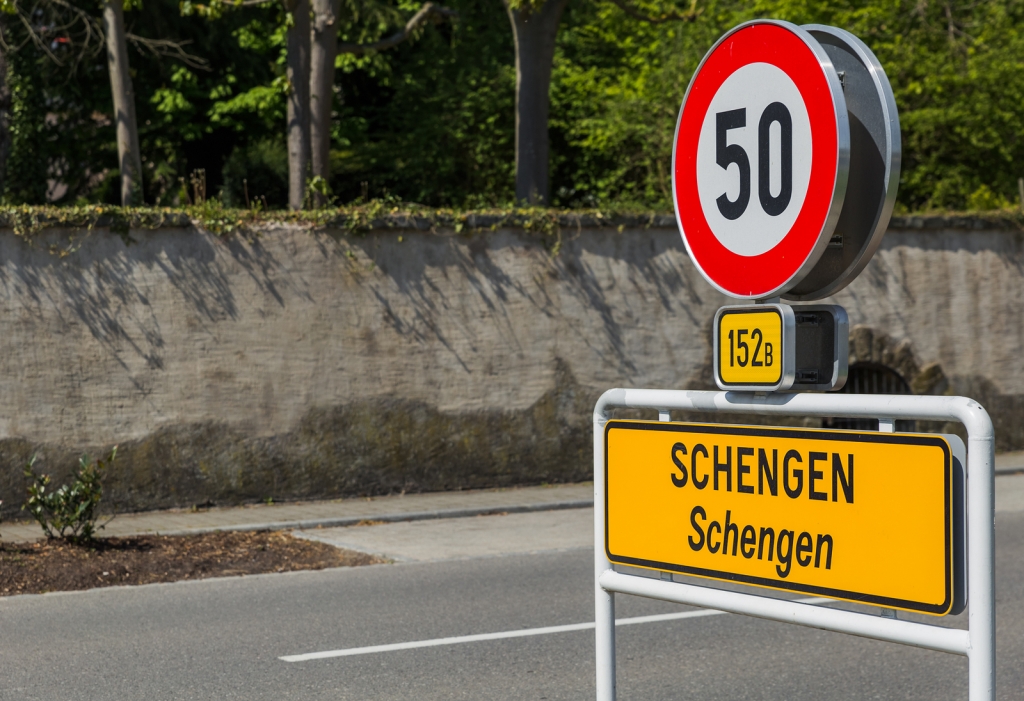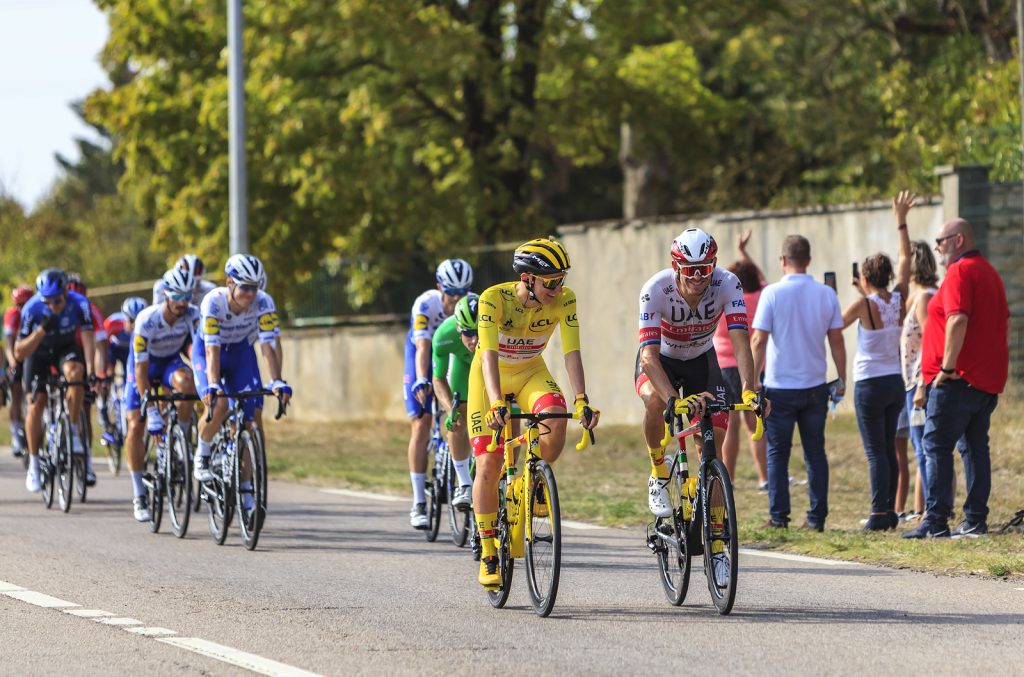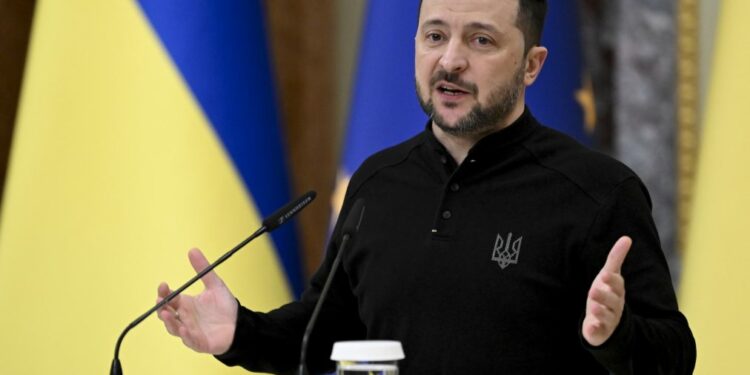In neighbouring Moldova, Maia Sandu (above) was re-elected for a second term in office, comfortably defeating—with significant help from Moldova’s large diaspora—the Russian-backed candidate Alexandr Stoianoglo.
Sandu also managed to push through a referendum on a constitutional amendment that enshrines Moldova’s ambition to one day join the EU in its constitution. As with the presidential election, it was the high number of votes in favour of the amendment cast by Moldova’s diaspora that won the day for the pro-EU camp.
North Macedonia swore in a new, nationalist-dominated government led by Prime Minister Hristijan Mickoski in June, following his party’s victory in elections in May.
The ruling coalition is now composed of Mickoski’s VMRO-DPMNE party, the Albanian alliance VLEN/VREDI and ZNAM, an ethnic Macedonian splinter from the Social Democrats (SDSM).
Mickoski, in his first speech as premier, told Macedonian MPs, “it is time to roll up the sleeves and start solving problems in this country”.
Croatia’s Prime Minister Andrej Plenković survived two no-confidence motions against his pro-European Union government in parliament in 2024, launched over a high-profile case of alleged corruption involving a former minister.
The motions were initiated by the opposition Social Democratic party, citing the involvement of government ministers and officials of the ruling Croatian Democratic Union in a series of corruption cases in recent years.
Poland, fresh off the 2023 elections that ushered in a more pro-EU coalition, spent much of 2024 restoring its credentials as a team player in Brussels. Parliament passed long-debated judicial reforms to address rule-of-law concerns, unlocking much-needed EU recovery funds.
Nevertheless, the government had to deal with delicate domestic debates on how best to handle abortion (still basically illegal), migration, and manage rising housing costs, reflecting a Poland in flux yet steadying its European course.
In 2025, the country elects a new president. Mayor of Warsaw Rafał Trzaskowski, backed by Civic Coalition, the largest party in government, will be the hot favourite.
In Hungary, PM Viktor Orbán has had to deal with the biggest threat to his grip on office: the rise of a new opposition figure, Péter Magyar, a former member of Orbán’s Fidesz party.
In November, Magyar accused Orbán’s government of spying on him and his staff.“Intelligence officers who serve their country and not a mafia government have confided in me that my apartment, our offices and our vehicles have been bugged for months,” said Magyar, who now leads the opposition Tisza party, which is currently polling well ahead of Fidesz. Hungary next elects a parliament in 2026.
Earlier in the year, in February, Hungary’s president, Katalin Novák, a staunch Orbán ally, was forced to step down over her decision to pardon a man convicted of helping cover up a sex abuse case at a children’s home. Hungary’s parliament later elected a former head of the Constitutional Court, lawyer Tamás Sulyok, to replace her as president.
Serbia was hit by a wave of protests in October in opposition to Rio Tinto’s planned lithium mine in the country, with demonstrators saying its development will damage the environment.
The protest comes after the ruling coalition led by the Serbian Progressive party (SNS), which holds an overwhelming majority, rejected an opposition draft law stipulating a ban on mining and exploration for lithium and borates.
Lithium, regarded as a critical material by the EU and the US, is used in batteries for electric vehicles and mobile devices. If implemented, Rio Tinto’s Serbia project could reportedly meet 90 per cent of Europe’s current lithium needs, positioning the country as one of the world’s leading lithium producers.
Fresh protests in December—when as many as 300,000 people rallied against President Aleksandar Vučić and the perceived corruption of the SNS, which they blame for a railway station roof collapse in November that killed 15 people—threatened to bring down the government.
For now, it hangs on.

Bulgaria and Romania were finally given the green light to join fully the border-free Schengen travel zone at a meeting of the European Council in December. While both countries had joined Schengen with their airports in March, controls had remained at land borders.
Border controls at land crossings between the two countries, and with other Schengen nations (Hungary, Greece) will now disappear entirely on January 1, 2025.
On Christmas Day, 38 people were killed when a passenger plane operated by Azerbaijan Airlines burst into flames as it crashed near the city of Aktau in Kazakhstan after veering hundreds of kilometres off its planned route.
The flight was carrying 62 passengers and five crew members from Azerbaijan’s capital, Baku, to the Russian city of Grozny in Chechnya. There was speculation in Russian media that the plane could have been shot down by Russian air defences, which mistook it for a Ukrainian drone.
Latvia’s investment promotion agency LIAA displaced Invest Estonia as the leading national investment promotion agency (IPA) in Central and Eastern Europe and the Baltics, ending four years of uninterrupted Estonian success. In the 2024 edition of Emerging Europe’s Investment Promotion Report, published in April, and which since 2018 has taken an in-depth look at how the region’s 23 IPAs communicate their investment opportunities and how they use their digital channels to get potential investors interested in the various business opportunities offered by the region’s key sectors, LIAA, third in 2023 behind Estonia and Lithuania, leapfrogged both of its Baltic neighbours to claim top spot.
Estonia retained top spot however on Emerging Europe’s IT Competitiveness Index, part of our annual Future of IT report. Estonia scored 63.83 out of a possible 100 points. Latvia (up from fourth) took second place with 60.46, overtaking both Lithuania (59.26) in third and Poland (54.62), which fell to fourth. Romania (53.28) rounded out the top five.
Estonia also took first place on our Future of Emerging Europe Sustainability Index, ahead of Slovenia and Czechia.
In October, Polish convenience retailer Żabka launched the region’s largest IPO of the year on the Warsaw Stock Exchange (GPW). The value of the IPO reached 6.45 billion złoty (1.5 billion euros) – making it the fourth biggest debut in the GPW’s history and putting the value of the entire company at 21.5 billion złoty (five billion euros). However, Żabka’s shares have since fallen around 12 per cent in value since the IPO.
Another retailer meanwhile, Croatia’s Studenac, cancelled its planned IPO (due to be split between the GPW and Zagreb exchanges) in November. The company and its Warsaw-based private equity owner Enterprise Investors had sought to raise as much as 794 million złoty (185 million euros) from the share sale.
It was reported that the Studenac IPO collapsed after the European Bank for Reconstruction and Development (EBRD) scrapped plans to buy a stake of as much as 10 per cent stake in the retailer.
In December, the sale of Royal Mail’s parent company to the Czech billionaire Daniel Křetínský was approved by the UK government after a review under national security laws, confirming the 3.6 billion UK pounds takeover of International Distribution Services (IDS)—the owner of the 508-year-old Royal Mail—by Křetínský’s EP Group.
It will be the first time Royal Mail has been controlled by an overseas owner in its history, which stretches back to 1635 when Charles I introduced a public postal service.
Also in December, Romanian businessman Dan Șucu bought a controlling, 77 per cent stake in Italy’s oldest football club, Genoa, for an undisclosed sum.
On May 7, 1986, Steaua Bucharest goalkeeper Helmuth Duckadam saved all four Barcelona penalties in a shoot-out to decide the European Cup Final in favour of the Romanian side. He remains the only keeper in history to do so.
Though Duckadam’s career was soon after cut short by a rare blood disorder, he remained an icon of both Steaua and Romanian football until his untimely death at the age of just 65 in December.
“Romanian football lost a legend and we, all of us who love this sport, lost a role model,” said Razvan Burleanu, president of the Romanian Football Federation (FRF). “Helmut Duckadam was not only an exceptional goalkeeper, but a symbol of the impossible transformed into reality.
“Through his heroic performance in Seville, he put Romania on the map of world football.”

It was a good year for sportsmen and women—and teams—from Central and Eastern Europe and the Caucasus in 2024. Four stand out, however: Slovenian cyclist Tadej Pogačar (pictured above), Ukrainian boxer Oleksandr Usyk, Ukrainian high jumper Yaroslava Mahuchikh, and the Georgian men’s football team.
Pogačar was all but unbeatable in 2024, winning just about every race he entered, including the Tour de France, the Giro d’Italia and the World Road Race Championships—widely viewed as being cycling’s triple crown. He also won the Volta a Catalunya, Liège–Bastogne–Liège, the Giro di Lombardia, and Strade Bianche. Not since the days of Eddy Merckx in the early 1970s has one cyclist dominated the sport in such a way.
Usyk meanwhile became the first undisputed world heavyweight champion of the four-belt era when he defeated Tyson Fury on points in May 2024. That also made the Ukrainian the first undisputed heavyweight king since British fighter Lennox Lewis in 1999. Usyk beat Fury again in December.
Mahuchikh also had an extraordinary 2024, breaking a world record that had stood since 1987 and winning Olympic gold. She was later in the year named female athlete of 2024 by the World Athletics.
Finally, Georgia’s national football team may not have made it past the second round at the European Championships in the summer, but their style of play—gung ho in an era of safety-first soccer—won them many friends and entertained us all. And in Giorgi Mamardashvili—set to join Liverpool next summer—they could also boast the tournament’s best goalkeeper.
Main photo: © European Union.
At Emerging Europe, we use an integrated approach centred around market intelligence to help organisations understand trends and strategically position themselves for success.
Learn how our solutions can help you thrive in the region:
Company and Services Overview | Strategic Advantage.
Source link : http://www.bing.com/news/apiclick.aspx?ref=FexRss&aid=&tid=676e138879ef4bae916e10b6ad8e3626&url=https%3A%2F%2Femerging-europe.com%2Fanalysis%2Fthat-was-the-year-that-was-emerging-europe-in-2024%2F&c=784158965360939532&mkt=de-de
Author :
Publish date : 2024-12-26 17:59:00
Copyright for syndicated content belongs to the linked Source.


